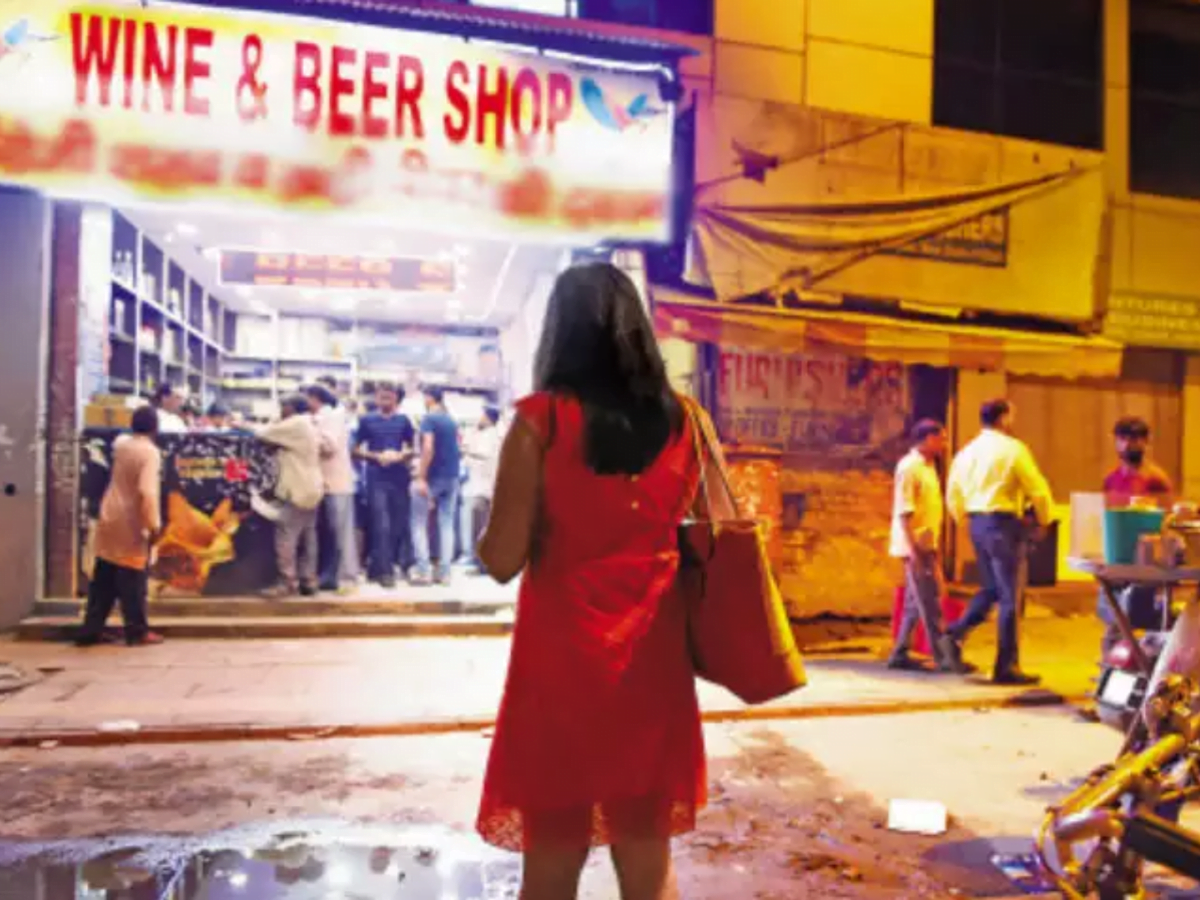“I was filmed by a man when I went to buy alcohol at one of the local wine shops”, says Shravya, 23, who’s working as a Public Relations associate in Hyderabad. While shooting the video, he was saying “what a disgraceful situation to see women visiting wine shops“. The consumption of alcohol by women is still a taboo in contemporary society. More often, women consuming alcohol is looked as a ‘crime’ by the conventional society. While men take immense pride in the quantity of consumption and boast about ‘being stable’, women get stereotyped for the same. The dominant presence of men at the wine shops creates inconvenience for the women which doesn’t allow them to get some courage to visit the wine shop and purchase what they want.
The social standards that are imposed on women to behave in particular codes of conduct deny women access to public places. The patriarchal society that has set boundaries for women can never tolerate women breaking those boundaries. Men become the strict implementers of these rules and regulations and they make sure that the patriarchal norms are followed by women. Men’s intolerance towards women accessing these, otherwise ‘men’s places’, irritates them and results in misbehaving and abuse.
While women have to face the everyday struggle of ‘being woman’, visiting these unwritten, invisible, ‘exclusively for men’ places is quite a herculean task. The fear of abuse, the man’s gaze, fear of being judged, are some of the major reasons that discourage women to make an attempt in visiting wine shops. For women in India, visiting wine shops is not as comfortable as shopping in shopping malls.
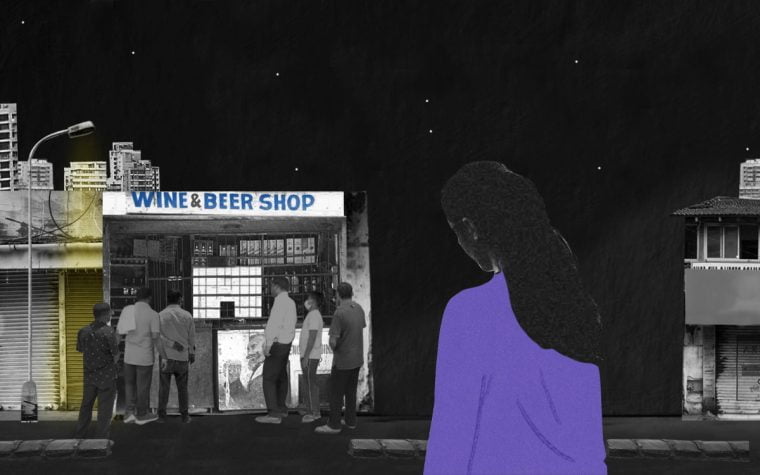
The social standards that are imposed on women to behave in particular codes of conduct deny women access to public places. The patriarchal society that has set boundaries for women can never tolerate women breaking those boundaries. Men become the strict implementers of these rules and regulations and they make sure that the patriarchal norms are followed by women. Men’s intolerance towards women accessing these, otherwise ‘men’s places’, irritates them and results in misbehaving and abuse.
This act of violence is to remind women that they don’t belong there, to say that this space is an exclusive men’s space.
“I have the fear of groping if I have to visit the wine shop“, says Varsha, 23. “Men around there might touch inappropriately and create inconvenience to me. Though I have never visited the place, I have a sense of immense fear deep inside me. I can’t even think of going there“, she adds.
The safety of women in public places is still highly questionable, and places heavily dominated by men can’t even be imagined as accessibility for women. The places like chai cafes, police stations, swimming pools, Pan shops, bars and restaurants etc, are “other” grave areas where women feel so insecure in visiting. “We often hear the question ‘Why should women visit these places when they already know that these spaces are not safe for them?‘. The point here is that ‘why should men decide where women should be and should not be?‘ Our point is not about women consuming or not consuming alcohol, but about exercising rights over the spaces that are heavily dominated and controlled by men.“
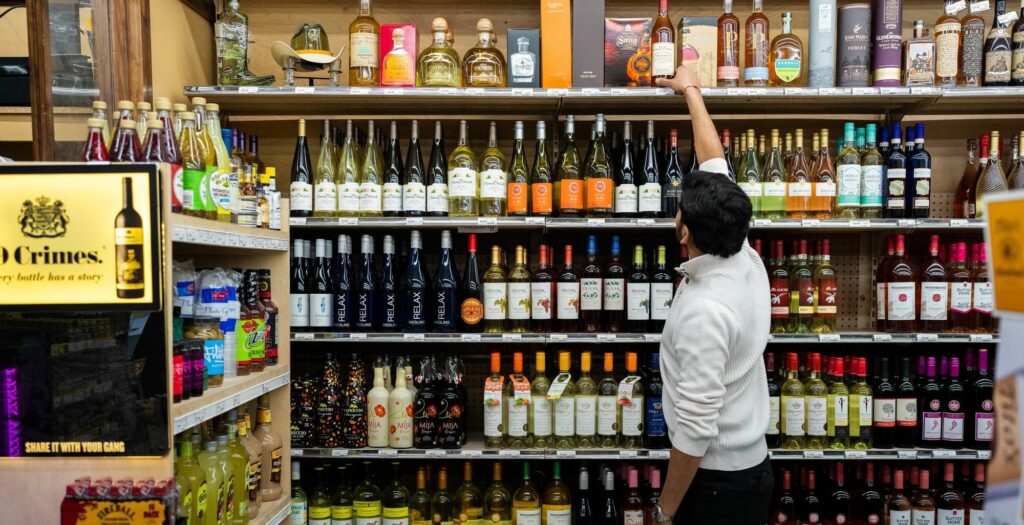
“I don’t prefer to drink alcohol, or rather I would kill the idea of drinking if I don’t have anyone who can get it for me“, says Shruthi, 33. “I will ask my dad to get it“, she adds. She says that she is afraid of groping and getting crushed in the queue. The raw and rugged ambience at the wine shop doesn’t allow her to give a thought of visiting the wine shop.
I once went to a wine shop with a male friend. I wanted to experiment and experience how does it feel to be there. Though I relied on my friend for safety and nothing bad happened, I felt very suffocated. I witnessed that ‘stranger look’ in the eyes of the people there.
Mounika, 24
The perimeter of the wine shop generates danger waves to women. For women, passing by the lane itself is a fearful task. Men might pass a comment, catcall, follow and try to approach and touch inappropriately. “I was followed by a man one evening on my way home. He was staggering and moving towards me, but somehow I escaped”, says Chandaneshwari, 33. There is a wine shop right opposite the bus stop where she gets off the bus, and every evening she finds ways to reach home safely.
“I once went to a wine shop with a male friend. I wanted to experiment and experience how does it feel to be there. Though I relied on my friend for safety and nothing bad happened, I felt very suffocated. I witnessed that ‘stranger look’ in the eyes of the people there“, says Mounika, 24. Men feel entitled over women due to their presence in those spaces.
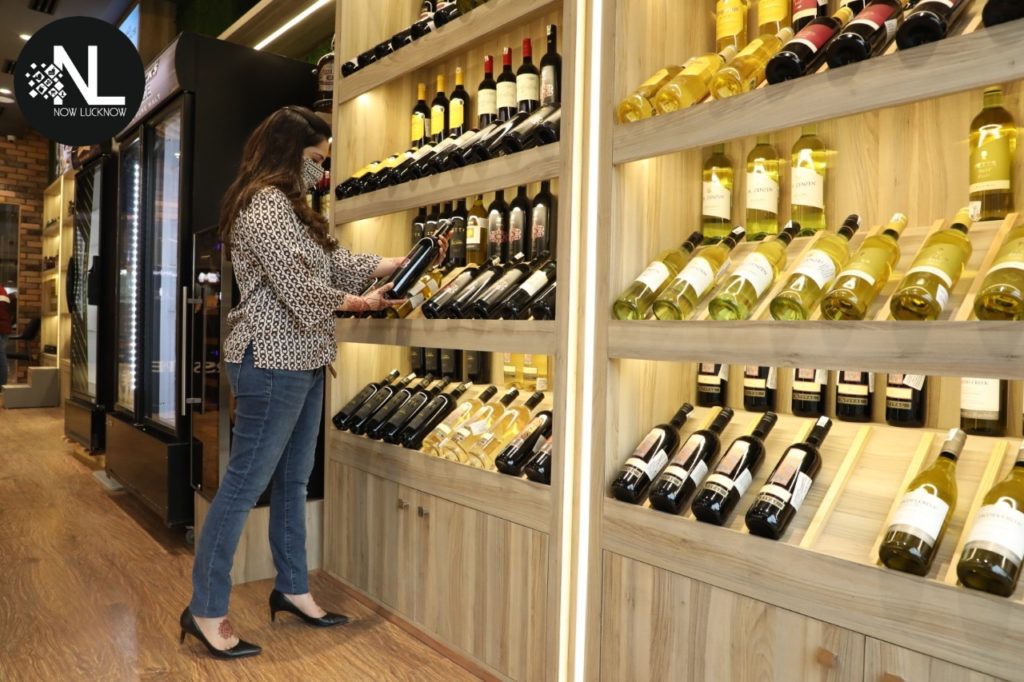
While the local wine shops are clearly unsafe and unwelcoming for women to access the space, the liquor marts are quite accommodating. The proliferation of liquor marts is a welcoming move in terms of accessibility for women. While the wine shops scare women, the liquor marts are reasonably women-friendly. The marts are very much unlike the regular wine shops.
Women can straight away walk into the mart, pick the item, bill and leave, without having to fear the gaze at all times. The fear of judgment is minimised, unlike the regular conventional wine shops. The aesthetic appeal of the space in terms of the display of the bottles, air-conditioned space, polite sales associates, availability of a variety of brands, and surveillance cameras, change the dynamics of purchasing alcohol.
For a few women, buying alcohol in the liquor mart is more like a casual shopping experience in any other shopping mall. This space is considerably more democratic and inclusive which opens doors for women with a little amount of fear of being judged. The price difference will exclude a larger chunk of men and discourage their entry to the liquor mart. A certain level of acceptance of women’s presence is visible in these spaces.
For a few women, buying alcohol in the liquor mart is more like a casual shopping experience in any other shopping mall. This space is considerably more democratic and inclusive which opens doors for women with a little amount of fear of being judged. The price difference will exclude a larger chunk of men and discourage their entry to the liquor mart. A certain level of acceptance of women’s presence is visible in these spaces.
Anuja, 29, says that she always had a good experience visiting the liquor mart and found the sales associates very helpful. We are not saying that these spaces are totally safe and secure for women, but these spaces are relatively tolerant to women’s presence. The ambience of the liquor mart doesn’t appreciate, or it minimises abuse or mockery of women being there. The presence of surveillance cameras poses a threat to the abuser.
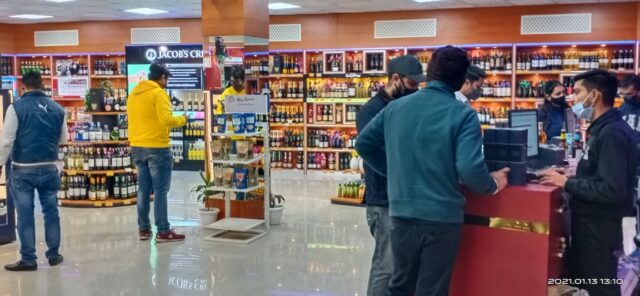
Divyashri, 23, says, “Visiting a liquor mart makes it slightly easier for women since for a lot of people it is okay to see women in a mart”. She says that in either place women had to receive ‘those stares’. Sharing her experience, Dharshini, 25, says, “The men customers present in the mart paved the way for me while I stepped in. I, very confidently, took three breezers and stepped out proudly. It is just like going to any mall or store.” Though it seems to be a cake walk for some women to step into the liquor marts, it also differs with the type of locality that the liquor mart is situated in. In the affluent areas of the city, (Hyderabad: like Banjara Hills, Madhapur, Gachibowli), the crowd in the mart doesn’t care which gender you are unlike other non-affluent areas in the city.
The men in the mart too stare at you as well, from head to toe, judging, and also eye candying on you. There was one instance in a famous liquor mart where a group of men were blocking my way to the fridge and not allowing me to access it. They also abruptly stopped their conversation to take a moment and stare at me, as if a rare creature walked in to buy alcohol. It definitely is creepy when the employee at the billing counter is blushing and staring at you as he generates your bill.
Sharen, 25
Sharen, 25, shares her experience of visiting both the local wine shops and liquor marts where she says there is not much difference between the places. She says, “The scary thing about going to a local wine store as a female, either alone or maybe with another female friend, is that you never know which drunk man could misbehave with you“. She adds, “The men in the mart too stare at you as well, from head to toe, judging, and also eye candying on you“. Recollecting her visit to the mart, she says, “There was one instance in a famous liquor mart where a group of men were blocking my way to the fridge and not allowing me to access it. They also abruptly stopped their conversation to take a moment and stare at me, as if a rare creature walked in to buy alcohol. It definitely is creepy when the employee at the billing counter is blushing and staring at you as he generates your bill“.
Bracketing and categorising women are witnessed on a larger scale. Men tend to issue a ‘character certificate’ to women for their every act of ‘unconventional’ behaviour, and character assassination is quite a common phenomenon. When women tend to exercise their rights, they are judged and pulled down. They are mocked, teased and branded. An invisible code of conduct is smeared on women’s appearance, presence, behaviour and attitude.

Not following the gender rules, set by the dominant systems, is considered a discipline issue and men think that it needs to be corrected. Any resistance to the existing systems is understood as deviancy, by men, and they fear that it could pose a serious threat to the social milieu.
Speaking in the line of inclusivity, we cannot ignore the point of which class of women are accessing these spaces. The marts’ ‘eliteness’ definitely caters for the needs of only a particular class of women and excludes many other women.
When we asked one of our final year undergraduate students, Rama Ghosh, to say whether women feel safe in a liquor mart unlike local wine shops, she out rightly said that women don’t feel safe anywhere. While we are trying to look at liquor marts as inclusive spaces, there is a long way to go for women to totally feel secure in these public spaces, say any public place.
Speaking in the line of inclusivity, we cannot ignore the point of which class of women are accessing these spaces. The marts’ ‘eliteness’ definitely caters for the needs of only a particular class of women and excludes many other women.
Men taking women’s presence for granted is an outcome of deep-rooted patriarchy which has to be uprooted. The concepts of gender sensitisation, acceptance, inclusion, and tolerance have to be taught in the school curriculum to bring change.
